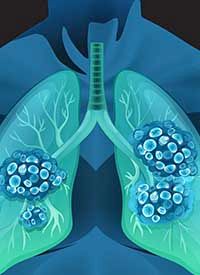Adjuvant Pembrolizumab Receives Positive CHMP Opinion for High-Risk NSCLC After Resection and Chemo
The European Medicines Agency’s Committee for Medicinal Products for Human Use has recommended the approval of pembrolizumab as adjuvant treatment for adult patients with non–small cell lung cancer who are at high risk of recurrence following complete resection and platinum-based chemotherapy.
Lung cancer: © - stock.adobe.com

The European Medicines Agency’s Committee for Medicinal Products for Human Use (CHMP) has recommended the approval of pembrolizumab (Keytruda) as adjuvant treatment for adult patients with non–small cell lung cancer (NSCLC) who are at high risk of recurrence following complete resection and platinum-based chemotherapy.1
The positive opinion was supported by data from the phase 3 PEARLS/KEYNOTE-091 trial (NCT02504372), which showed that treatment with pembrolizumab (n = 590) led to a statistically significant improvement in disease-free survival (DFS) vs placebo (n = 587) in the intention-to-treat population (HR, 0.76; 95% CI, 0.63-0.91; P = .0014).2 The median DFS was 53.6 months (95% CI, 39.2-not reached [NR]) in the pembrolizumab group compared with 42.0 months (95% CI, 31.3-NR) in the placebo group.
Findings from a subgroup analysis showed that patients in the pembrolizumab arm who also underwent at least 1 cycle of adjuvant chemotherapy (n = 506) experienced a median DFS of 58.7 months (95% CI, 39.2-NR) compared with 34.9 months (95% CI, 28.6-NR) for those in the placebo group who also received adjuvant chemotherapy (n = 504; HR, 0.73; 95% CI, 0.60-0.89).3
“While [pembrolizumab] is foundational in the treatment of metastatic NSCLC, there continues to be an unmet need to help more patients with lung cancer in earlier stages of disease,” Gregory Lubiniecki, MD, vice president of Global Clinical Development at Merck Research Laboratories, stated in a news release.1 “The CHMP’s positive recommendation brings us one step closer to providing a new adjuvant treatment option for patients in the European Union with earlier stages of NSCLC, regardless of PD-L1 expression.”
KEYNOTE-091 was a randomized, triple-blind trial that enrolled patients at least 18 years of age with completely resected, pathologically confirmed stage IB, II, or IIIA NSCLC per the American Joint Committee on Cancer staging system 7th edition.2 Patients were allowed to have any histology or PD-L1 expression. An ECOG performance status of 0 or 1 was required. Adjuvant chemotherapy needed to be considered for patients with stage IB disease and was strongly recommended for those with stage II or IIIA disease.
Patients were randomly assigned 1:1 to receive 200 mg of pembrolizumab or placebo, which were both administered intravenously every 3 weeks for up to 18 cycles. Patients were stratified by disease stage, previous adjuvant chemotherapy, PD-L1 expression, and geographical region.
DFS in the overall population and in the population with a PD-L1 tumor proportion score (TPS) of at least 50% were co-primary end points. Safety served as a secondary end point.
Additional data showed that in the population of patients with a PD-L1 TPS of 50% or greater, those treated with pembrolizumab (n = 168) achieved a median DFS of NR (95% CI, 44.3-NR) compared with NR (95% CI, 35.8-NR) for those treated with placebo (n = 165; HR, 0.82; 95% CI, 0.57-1.18; P = .14).
Regarding safety, grade 3 or higher adverse effects (AEs) were reported in 34% of evaluable patients treated with pembrolizumab (n = 580) compared with 26% of evaluable patients who received placebo (n = 581). The most common grade 3 or higher AEs that occurred in at least 10 participants in either treatment group included hypertension (6%) and pneumonia (2%) for pembrolizumab and hypertension (6%) for placebo.
The rates of serious AEs were 24% for the pembrolizumab arm and 15% for the placebo arm. Serious AEs reported in more than 1% of patients in the pembrolizumab arm were pneumonia (2%), pneumonitis (2%), and diarrhea (1%). In the placebo group, pneumonia (2%) was the most common serious AE.
Treatment-related AEs (TRAEs) led to death in 1% of patients treated with pembrolizumab, including cardiogenic shock and myocarditis (n = 1), septic shock and myocarditis (n = 1), pneumonia (n = 1), and sudden death (n = 1). No TRAEs led to death in the placebo arm.
In January 2023, the FDA approved pembrolizumab as an adjuvant treatment following resection and platinum-based chemotherapy for patients with stage IB (T2a ≥4 cm), II, or IIIA NSCLC, based on data from KEYNOTE-091.4
References
- Merck receives positive EU CHMP opinion for Keytruda (pembrolizumab) as adjuvant treatment for adults with non-small cell lung cancer at high risk of recurrence following complete resection and platinum-based chemotherapy. News release. Merck. September 15, 2023. Accessed September 15, 2023. https://www.merck.com/news/merck-receives-positive-eu-chmp-opinion-for-keytruda-pembrolizumab-as-adjuvant-treatment-for-adults-with-non-small-cell-lung-cancer-at-high-risk-of-recurrence-following-complete-resection-and/
- O'Brien M, Paz-Ares L, Marreaud S, et al. Pembrolizumab versus placebo as adjuvant therapy for completely resected stage IB-IIIA non-small-cell lung cancer (PEARLS/KEYNOTE-091): an interim analysis of a randomised, triple-blind, phase 3 trial. Lancet Oncol. 2022;23(10):1274-1286. doi:10.1016/S1470-2045(22)00518-6
- Oselin K, Shim BY, Okada M, et al. Pembrolizumab vs placebo for early-stage non‒small-cell lung cancer after resection and adjuvant therapy: Subgroup analysis of patients who received adjuvant chemotherapy in the phase 3 PEARLS/KEYNOTE-091 study. J Clin Oncol. 2023;41(suppl 16):8520. doi:10.1200/JCO.2023.41.16_suppl.8520
- FDA approves pembrolizumab as adjuvant treatment for non-small cell lung cancer. News release. FDA. January 26, 2023. Accessed September 15, 2023. https://www.fda.gov/drugs/resources-information-approved-drugs/fda-approves-pembrolizumab-adjuvant-treatment-non-small-cell-lung-cancer



